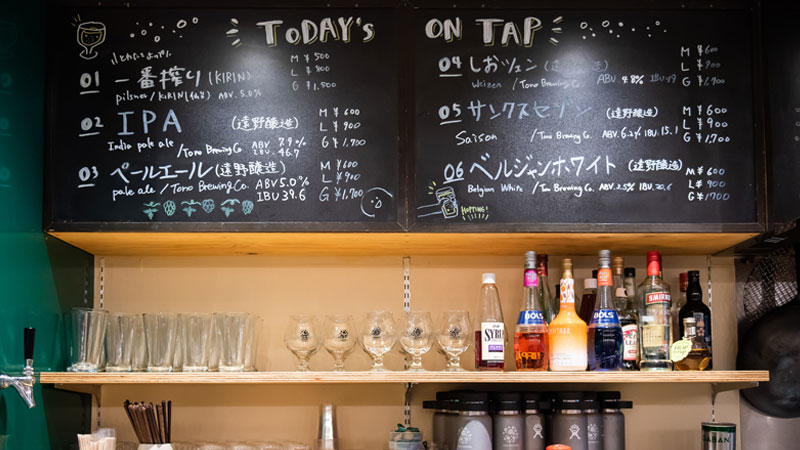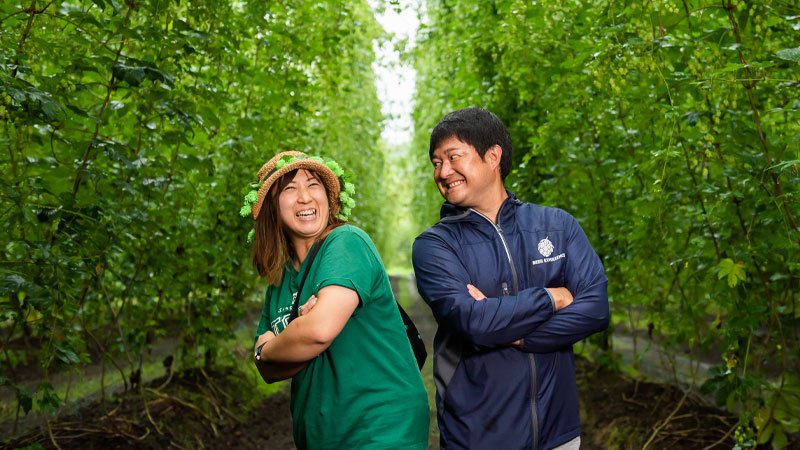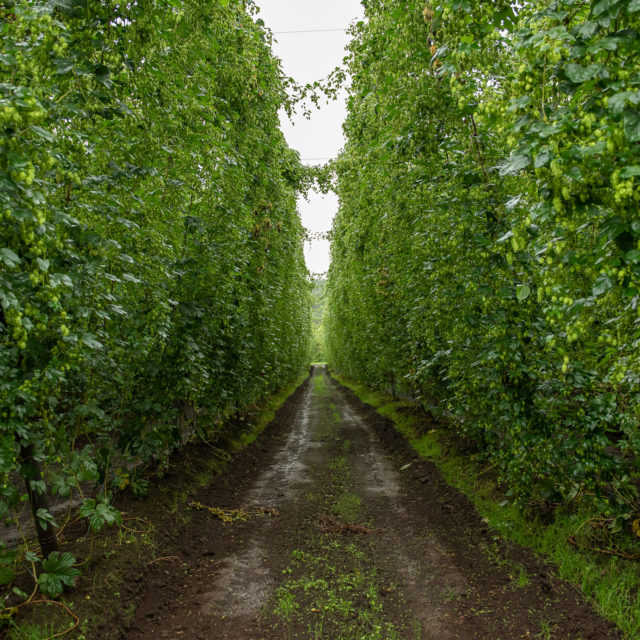Ryuhei Asai gestures excitedly as he tramps across a sodden field in Tono, Japan. This, he says, is where hops will flourish, pointing toward the bare trellises towering overhead.
About 20 feet away from where we’re standing, a mobile bar will sit and dispense beer, according to Asai’s colleague, Junko Miura (who goes by “MJ”). Wearing a straw hat festooned with plastic hops, MJ cheerfully holds up her phone to show a picture of a gleaming chrome Airstream trailer with a side panel ratcheted up, beer taps at the ready.
Asai and Miura work for Tono Beer Experience, a tour company that focuses not just on beer, but specifically on hops. “Because it’s such an everyday thing people take it for granted, and they don’t really know the true story about what it’s made of,” Asai says.
Their business is located in Tono, a small city that holds special significance in Japan’s beer industry. Tono is in Iwate prefecture in Tōhoku, the northernmost region of Japan’s largest island, Honshu. The area is predominantly agricultural, and it mostly grows hops.

Unfortunately, an array of socioeconomic factors, not to mention the lingering effects of natural disasters, threatens beer culture in Japan. Tono Beer Experience is part of a group of brewers, farmers, and local business owners hoping to reclaim Tono’s identity (and solvency) through craft beer. To do so, they’re turning to their greatest homegrown resource: hops.
According to Asai, 70 percent of beer produced by Kirin Ichiban Brewery uses native Japanese hops, and the majority of all Japan’s hops come from Tono. This includes native varieties like Ibuki, a hop with aromatic notes of lemon and grapefruit, and Murakami Seven, a variety with an aroma of grapes named for Murakami Asahi, the Japanese hops researcher and breeder responsible for its development.
In 2011, Tōhoku was the region most impacted by the major earthquake and tsunami that hit Japan. Today, farmers in Iwate and Tono face many of the same problems as those in the American agriculture industry — economic downturn, unstable prices, and a dearth of next-generation career farmers — while also grappling with the lingering impact of the earthquake.
As of about 20 years ago, there were 239 hops farmers in Tono, Asai says. Now, there are only 33. Tono’s current hop production is one-fifth of what it was in previous decades. “There’s no one to pass on the crop to,” Asai says.
Young people in Japan are also drinking less than they used to, and, when they do, they favor cocktails over beer. Older people tend to be beer drinkers, Asai says, which presents a problem in light of Japan’s famously aging population.
Several forces are now working together to revive Tono and its hops industry. Kirin is investing in rebuilding projects. In 2014, the city launched a now-annual, weekend-long Hops Harvest Festival specifically designed to increase hops knowledge and encourage local pride. Farmers harvest Padrón peppers alongside their hops, which are used to make popular drinking snacks.
In January and February 2018, the city ran a crowdfunding campaign to build the Tono Brewing Company. Its efforts raised ¥7,941,443 (approximately $73,799) and the brewpub opened in May 2018.
While craft beer was already available in the area at local stops like the Kamigyo Izu Brewery (which primarily produces sake), Tono Brewing Co. is devoted to craft beer and serves as a communal gathering space that would benefit the city and its residents. The fermentation tanks are emblazoned with the names of crowdfunding supporters, and the furniture was built by city residents. Flip over a stool or peer beneath a table, and you’ll see the name of the person who built it written on the underside.

Tono Brewing Co. also provided an opportunity to bring new brewing talent to the city. Daisuke Hakamada, who previously worked for the Yokohama Bay Brewing Company, is one of Tono Brewing Co.’s three employees. He came to Tono as the result of an international recruitment campaign that had 80 applicants (including two Americans) vying for two positions.
“We want to become a place where the local people can enjoy local beer and hop culture,” he says. “To use beer and local hops to revitalize the town.”
In Japan, Hakamada says, the label “beer” almost always means lager or pilsner. He’d like Japanese drinkers to have a broader sense of beer, and for local hops farmers to be more directly involved in the brewing process so they can better understand the influence of their hops. He also hopes to help guide the community to grow different types of hops, especially those suitable for craft beer.
Ekiko Miura, the 70-year-old owner of a local guest house, Minshuku Rindo, has noticed the changes in Tono since the city began focusing on craft beer. “It’s a new way of drinking,” she says. “People aren’t just drinking to get drunk. They’re drinking because they enjoy the beer.”
Craft beer and the focus on hops are generating interest from a younger generation of visitors, too. Miura says she has a lot of gratitude for beer and the people who work in beer tourism because they’ve made a lot of positive changes in the town. “I’m hopeful for the future of Tono because of these young people,” she says.
